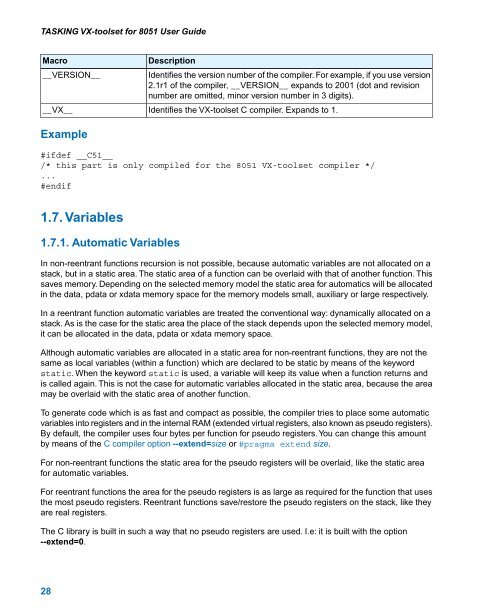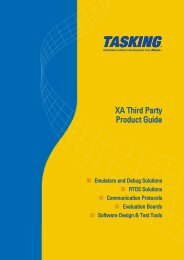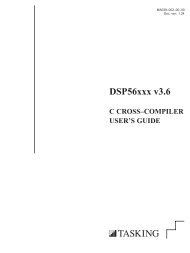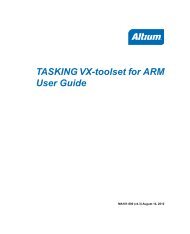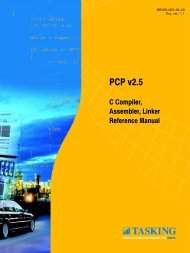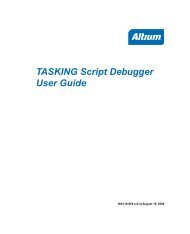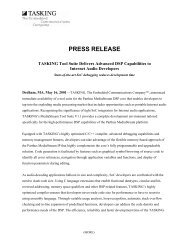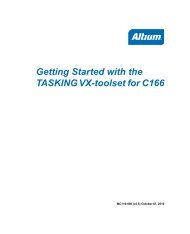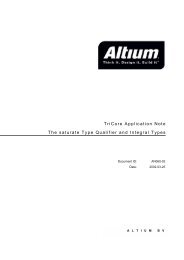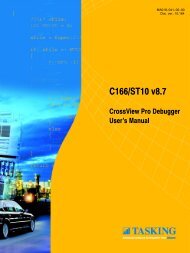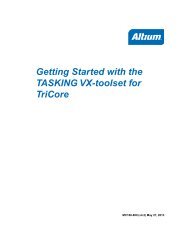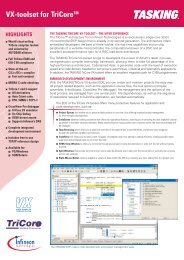- Page 1 and 2: TASKING VX-toolset for 8051User Gui
- Page 3 and 4: Table of Contents1. C Language ....
- Page 5 and 6: TASKING VX-toolset for 8051 User Gu
- Page 7 and 8: TASKING VX-toolset for 8051 User Gu
- Page 9 and 10: Chapter 1. C LanguageThis chapter d
- Page 11 and 12: C Language• Pointer to __bit is a
- Page 13 and 14: C LanguageThe 8051 C compiler is ve
- Page 15 and 16: C Language3. Optionally enable the
- Page 17 and 18: C Languageint b6 : 1;int b7 : 1;int
- Page 19 and 20: C Languageregister file you want us
- Page 21 and 22: C LanguageConstraintcharacterTypeOp
- Page 23 and 24: C Language}"MOV %0, A": "=r" (out):
- Page 25 and 26: C LanguageMOV R1, A; Code generated
- Page 27 and 28: C Languagealias("symbol")You can us
- Page 29 and 30: C LanguagenoreturnSome standard C f
- Page 31 and 32: C LanguageYou can see a label pragm
- Page 33 and 34: C Languagebinary_switchsmart_switch
- Page 35: C LanguageA weak definition can be
- Page 39 and 40: C LanguageA jump chain is comparabl
- Page 41 and 42: C LanguageParameter Type32 bitRegis
- Page 43 and 44: C LanguageSaved valueStackOffset (f
- Page 45 and 46: C Languagecaller savescallee savesd
- Page 47 and 48: C Language...}The __isr type qualif
- Page 49 and 50: C Language__bank0 void main( void )
- Page 51 and 52: C LanguageAssign value to the bit a
- Page 53 and 54: C Language__pdata int barcode;/* Se
- Page 55 and 56: Chapter 2. Assembly LanguageThis ch
- Page 57 and 58: Assembly LanguageCharacter Descript
- Page 59 and 60: Assembly Language2.5. RegistersThe
- Page 61 and 62: Assembly LanguageBaseBinaryOctalDes
- Page 63 and 64: Assembly LanguageTypeOperatorNameDe
- Page 65 and 66: Assembly LanguageWhen a macro is ca
- Page 67 and 68: Assembly LanguageMOV R5, #2MOV R0,
- Page 69 and 70: Assembly Language)INC R0DJNZ R7, %L
- Page 71 and 72: Assembly LanguageComment function:
- Page 73 and 74: Assembly LanguageEscape function: %
- Page 75 and 76: Assembly LanguageGroup function: %{
- Page 77 and 78: Assembly Language%EQS, %NES, %LTS,
- Page 79 and 80: Assembly Language%EVALSyntax%EVAL(e
- Page 81 and 82: Assembly Language%SET(MVAR,0)%UNTIL
- Page 83 and 84: Assembly Language%IFSyntax%IF(expre
- Page 85 and 86: Assembly Language%IFDEF, %IFNDEFSyn
- Page 87 and 88:
Assembly Language%IN, %OUTSyntax%IN
- Page 89 and 90:
Assembly Language.db 3.db 4The resu
- Page 91 and 92:
Assembly Language%MATCHSyntax%MATCH
- Page 93 and 94:
Assembly Language%METACHARSyntax%ME
- Page 95 and 96:
Assembly Language%REPEATSyntax%REPE
- Page 97 and 98:
Assembly Language%SUBSTRSyntax%SUBS
- Page 99:
Assembly Language%WHILESyntax%WHILE
- Page 102 and 103:
TASKING VX-toolset for 8051 User Gu
- Page 104 and 105:
TASKING VX-toolset for 8051 User Gu
- Page 106 and 107:
TASKING VX-toolset for 8051 User Gu
- Page 108 and 109:
TASKING VX-toolset for 8051 User Gu
- Page 110 and 111:
TASKING VX-toolset for 8051 User Gu
- Page 112 and 113:
TASKING VX-toolset for 8051 User Gu
- Page 114 and 115:
TASKING VX-toolset for 8051 User Gu
- Page 116 and 117:
TASKING VX-toolset for 8051 User Gu
- Page 118 and 119:
TASKING VX-toolset for 8051 User Gu
- Page 120 and 121:
TASKING VX-toolset for 8051 User Gu
- Page 122 and 123:
TASKING VX-toolset for 8051 User Gu
- Page 124 and 125:
TASKING VX-toolset for 8051 User Gu
- Page 126 and 127:
TASKING VX-toolset for 8051 User Gu
- Page 128 and 129:
TASKING VX-toolset for 8051 User Gu
- Page 130 and 131:
TASKING VX-toolset for 8051 User Gu
- Page 132 and 133:
TASKING VX-toolset for 8051 User Gu
- Page 134 and 135:
TASKING VX-toolset for 8051 User Gu
- Page 136 and 137:
TASKING VX-toolset for 8051 User Gu
- Page 138 and 139:
TASKING VX-toolset for 8051 User Gu
- Page 140 and 141:
TASKING VX-toolset for 8051 User Gu
- Page 142 and 143:
TASKING VX-toolset for 8051 User Gu
- Page 144 and 145:
TASKING VX-toolset for 8051 User Gu
- Page 146 and 147:
TASKING VX-toolset for 8051 User Gu
- Page 148 and 149:
TASKING VX-toolset for 8051 User Gu
- Page 150 and 151:
TASKING VX-toolset for 8051 User Gu
- Page 152 and 153:
TASKING VX-toolset for 8051 User Gu
- Page 154 and 155:
TASKING VX-toolset for 8051 User Gu
- Page 156 and 157:
TASKING VX-toolset for 8051 User Gu
- Page 158 and 159:
TASKING VX-toolset for 8051 User Gu
- Page 160 and 161:
TASKING VX-toolset for 8051 User Gu
- Page 162 and 163:
TASKING VX-toolset for 8051 User Gu
- Page 164 and 165:
TASKING VX-toolset for 8051 User Gu
- Page 166 and 167:
TASKING VX-toolset for 8051 User Gu
- Page 168 and 169:
TASKING VX-toolset for 8051 User Gu
- Page 170 and 171:
TASKING VX-toolset for 8051 User Gu
- Page 172 and 173:
TASKING VX-toolset for 8051 User Gu
- Page 174 and 175:
TASKING VX-toolset for 8051 User Gu
- Page 177 and 178:
Profiling4.2.2. Step 2: Displaying
- Page 179 and 180:
ProfilingCalls %In the caller table
- Page 181 and 182:
Chapter 5. Using the AssemblerThis
- Page 183 and 184:
Using the AssemblerTo access the as
- Page 185 and 186:
Using the AssemblerTo generate a li
- Page 187 and 188:
Chapter 6. Using the LinkerThis cha
- Page 189 and 190:
Using the LinkerTermRelocationinfor
- Page 191 and 192:
Using the LinkerTo assign locations
- Page 193 and 194:
Using the LinkerLibrariesc51m{r | s
- Page 195 and 196:
Using the LinkerUser libraryIf you
- Page 197 and 198:
Using the Linker6.6. Linker Optimiz
- Page 199 and 200:
Using the Linkername project_name.l
- Page 201 and 202:
Using the LinkerThe architecture de
- Page 203 and 204:
Using the Linker{}// section placem
- Page 205 and 206:
Using the Linker}id = 6;mau = 8;map
- Page 207 and 208:
Using the Linker6.7.6. The Processo
- Page 209 and 210:
Using the LinkerThe new memory is a
- Page 211 and 212:
Using the Linkerlabels are used to
- Page 213 and 214:
Using the LinkerExample on the comm
- Page 215 and 216:
Chapter 7. Using the UtilitiesThe T
- Page 217 and 218:
Using the Utilities7.2. Make Utilit
- Page 219 and 220:
Using the UtilitiesoptionFor a comp
- Page 221 and 222:
Using the UtilitiesTarget.SILENT.SU
- Page 223 and 224:
Using the UtilitiesLDFLAGS = -lc51s
- Page 225 and 226:
Using the Utilities$(match .obj pro
- Page 227 and 228:
Using the Utilitieselse-linesendif7
- Page 229 and 230:
Using the UtilitiesStatic pattern r
- Page 231 and 232:
Using the UtilitiesWith the += oper
- Page 233 and 234:
Using the Utilities7.3.4. Makefile
- Page 235 and 236:
Using the Utilities7.3.7. Makefile
- Page 237 and 238:
Using the Utilities7.4. ArchiverThe
- Page 239 and 240:
Using the UtilitiesDescriptionDispl
- Page 241 and 242:
Using the Utilities7.5. Expire Cach
- Page 243 and 244:
Chapter 8. Using the DebuggerThis c
- Page 245 and 246:
Using the DebuggerInitialization ta
- Page 247 and 248:
Using the Debugger• In the Projec
- Page 249 and 250:
Using the Debugger• Debugger loca
- Page 251 and 252:
Using the DebuggerTo open views in
- Page 253 and 254:
Using the DebuggerStepping through
- Page 255 and 256:
Using the DebuggerVT100 characteris
- Page 257 and 258:
Using the DebuggerRenderingsYou can
- Page 259 and 260:
Using the Debugger• You can chang
- Page 261 and 262:
Chapter 9. Tool OptionsThis chapter
- Page 263 and 264:
Tool OptionsEclipse optionDebugging
- Page 265 and 266:
Tool OptionsEclipse optionUse a 'fi
- Page 267 and 268:
Tool Options9.2. C Compiler Options
- Page 269 and 270:
Tool OptionsC compiler option: --ch
- Page 271 and 272:
Tool OptionsC compiler option: --de
- Page 273 and 274:
Tool OptionsC compiler option: --de
- Page 275 and 276:
Tool OptionsC compiler option: --de
- Page 277 and 278:
Tool OptionsTo write an explanation
- Page 279 and 280:
Tool OptionsC compiler option: --ex
- Page 281 and 282:
Tool OptionsC compiler option: --in
- Page 283 and 284:
Tool OptionsC compiler option: --in
- Page 285 and 286:
Tool OptionsC compiler option: --in
- Page 287 and 288:
Tool OptionsC compiler option: --is
- Page 289 and 290:
Tool OptionsC compiler option: --la
- Page 291 and 292:
Tool Optionsextern unsigned int var
- Page 293 and 294:
Tool OptionsC compiler option: --ma
- Page 295 and 296:
Tool OptionsC compiler option: --mi
- Page 297 and 298:
Tool OptionsC compiler option: --mi
- Page 299 and 300:
Tool OptionsC compiler option: --mo
- Page 301 and 302:
Tool OptionsC compiler option: --no
- Page 303 and 304:
Tool OptionsC compiler option: --no
- Page 305 and 306:
Tool OptionsC compiler option: --op
- Page 307 and 308:
Tool OptionsC compiler option: --op
- Page 309 and 310:
Tool OptionsC compiler option: --ou
- Page 311 and 312:
Tool OptionsWith --preprocess=+noli
- Page 313 and 314:
Tool OptionsC compiler option: --re
- Page 315 and 316:
Tool OptionsC compiler option: --re
- Page 317 and 318:
Tool OptionsC compiler option: --re
- Page 319 and 320:
Tool OptionsC compiler option: --ro
- Page 321 and 322:
Tool OptionsC compiler option: --so
- Page 323 and 324:
Tool OptionsC compiler option: --tr
- Page 325 and 326:
Tool OptionsC compiler option: --un
- Page 327 and 328:
Tool OptionsC compiler option: --ve
- Page 329 and 330:
Tool OptionsC compiler option: --wa
- Page 331 and 332:
Tool OptionsAssembler option: --all
- Page 333 and 334:
Tool OptionsAssembler option: --che
- Page 335 and 336:
Tool OptionsAssembler option: --deb
- Page 337 and 338:
Tool OptionsYou can now use a macro
- Page 339 and 340:
Tool OptionsAssembler option: --dia
- Page 341 and 342:
Tool OptionsAssembler option: --emi
- Page 343 and 344:
Tool OptionsAssembler option: --err
- Page 345 and 346:
Tool OptionsAssembler option: --inc
- Page 347 and 348:
Tool OptionsAssembler option: --inc
- Page 349 and 350:
Tool OptionsAssembler option: --kee
- Page 351 and 352:
Tool OptionsAssembler option: --lis
- Page 353 and 354:
Tool OptionsAssembler option: --mak
- Page 355 and 356:
Tool OptionsAssembler option: --no-
- Page 357 and 358:
Tool OptionsAssembler option: --opt
- Page 359 and 360:
Tool Options• It is possible to n
- Page 361 and 362:
Tool OptionsAssembler option: --pag
- Page 363 and 364:
Tool OptionsAssembler option: --par
- Page 365 and 366:
Tool OptionsAssembler option: --pre
- Page 367 and 368:
Tool OptionsAssembler option: --sec
- Page 369 and 370:
Tool OptionsAssembler option: --sym
- Page 371 and 372:
Tool OptionsAssembler option: --war
- Page 373 and 374:
Tool Options9.4. Linker OptionsThis
- Page 375 and 376:
Tool OptionsLinker option: --chip-o
- Page 377 and 378:
Tool OptionsLinker option: --define
- Page 379 and 380:
Tool OptionsThis is an error when t
- Page 381 and 382:
Tool OptionsLinker option: --error-
- Page 383 and 384:
Tool OptionsLinker option: --first-
- Page 385 and 386:
Tool OptionsLinker option: --hex-fo
- Page 387 and 388:
Tool OptionsLinker option: --import
- Page 389 and 390:
Tool OptionsLinker option: --increm
- Page 391 and 392:
Tool OptionsLinker option: --librar
- Page 393 and 394:
Tool OptionsFirst the linker looks
- Page 395 and 396:
Tool OptionsLinker option: --lsl-ch
- Page 397 and 398:
Tool OptionsLinker option: --lsl-fi
- Page 399 and 400:
Tool OptionsLinker option: --map-fi
- Page 401 and 402:
Tool OptionsLinker option: --misra-
- Page 403 and 404:
Tool OptionsLinker option: --no-res
- Page 405 and 406:
Tool OptionsLinker option: --no-war
- Page 407 and 408:
Tool OptionsDescriptionWith this op
- Page 409 and 410:
Tool Options• It is possible to n
- Page 411 and 412:
Tool OptionsUse option --chip-outpu
- Page 413 and 414:
Tool OptionsLinker option: --user-p
- Page 415 and 416:
Tool OptionsLinker option: --versio
- Page 417 and 418:
Tool Options9.5. Control Program Op
- Page 419 and 420:
Tool OptionsControl program option:
- Page 421 and 422:
Tool Optionscc51 --cpu=tc26x --incl
- Page 423 and 424:
Tool OptionsControl program option:
- Page 425 and 426:
Tool OptionsControl program option:
- Page 427 and 428:
Tool OptionsControl program option:
- Page 429 and 430:
Tool OptionsRelated informationSect
- Page 431 and 432:
Tool OptionsControl program option:
- Page 433 and 434:
Tool OptionsControl program option:
- Page 435 and 436:
Tool OptionsControl program option:
- Page 437 and 438:
Tool OptionsControl program option:
- Page 439 and 440:
Tool OptionsControl program option:
- Page 441 and 442:
Tool OptionsControl program option:
- Page 443 and 444:
Tool OptionsFirst the linker looks
- Page 445 and 446:
Tool OptionsControl program option:
- Page 447 and 448:
Tool OptionsControl program option:
- Page 449 and 450:
Tool OptionsControl program option:
- Page 451 and 452:
Tool OptionsControl program option:
- Page 453 and 454:
Tool Options--debug-info--define=DE
- Page 455 and 456:
Tool OptionsControl program option:
- Page 457 and 458:
Tool OptionsWith --preprocess=+make
- Page 459 and 460:
Tool OptionsControl program option:
- Page 461 and 462:
Tool OptionsControl program option:
- Page 463 and 464:
Tool OptionsControl program option:
- Page 465 and 466:
Tool OptionsControl program option:
- Page 467 and 468:
Tool OptionsControl program option:
- Page 469 and 470:
Tool OptionsDefining MacrosCommand
- Page 471 and 472:
Tool OptionsMake utility option: -a
- Page 473 and 474:
Tool OptionsMake utility option: -D
- Page 475 and 476:
Tool OptionsMake utility option: -e
- Page 477 and 478:
Tool OptionsMake utility option: -f
- Page 479 and 480:
Tool OptionsMake utility option: -i
- Page 481 and 482:
Tool OptionsMake utility option: -k
- Page 483 and 484:
Tool OptionsSpecify the option file
- Page 485 and 486:
Tool OptionsMake utility option: -p
- Page 487 and 488:
Tool OptionsMake utility option: -r
- Page 489 and 490:
Tool OptionsMake utility option: -s
- Page 491 and 492:
Tool OptionsMake utility option: -t
- Page 493 and 494:
Tool OptionsMake utility option: -W
- Page 495 and 496:
Tool OptionsMake utility option: -x
- Page 497 and 498:
Tool OptionsParallel make utility o
- Page 499 and 500:
Tool OptionsParallel make utility o
- Page 501 and 502:
Tool OptionsParallel make utility o
- Page 503 and 504:
Tool OptionsParallel make utility o
- Page 505 and 506:
Tool OptionsParallel make utility o
- Page 507 and 508:
Tool OptionsParallel make utility o
- Page 509 and 510:
Tool OptionsParallel make utility o
- Page 511 and 512:
Tool OptionsDescriptionDisplay opti
- Page 513 and 514:
Tool OptionsArchiver option: --dump
- Page 515 and 516:
Tool OptionsArchiver option: --help
- Page 517 and 518:
Tool OptionsArchiver option: --opti
- Page 519 and 520:
Tool OptionsArchiver option: --prin
- Page 521 and 522:
Tool OptionsThe library mylib.lib a
- Page 523 and 524:
Tool OptionsArchiver option: --warn
- Page 525 and 526:
Tool OptionsExpire cache utility op
- Page 527 and 528:
Tool OptionsExpire cache utility op
- Page 529 and 530:
Tool OptionsExpire cache utility op
- Page 531 and 532:
Tool OptionsExpire cache utility op
- Page 533 and 534:
Tool OptionsExpire cache utility op
- Page 535 and 536:
Chapter 10. LibrariesThis chapter c
- Page 537 and 538:
Librariesctype.h_tolower_toupperisa
- Page 539 and 540:
Librariesferaiseexceptfesetexceptfl
- Page 541 and 542:
Libraries#define and &&#define and_
- Page 543 and 544:
LibrariesExponential and logarithmi
- Page 545 and 546:
LibrariesManipulation functions: co
- Page 547 and 548:
LibrariesSIGILLSIGFPESIGSEGVSIGTERM
- Page 549 and 550:
LibrariesMacrosstdio.hNULLBUFSIZEOF
- Page 551 and 552:
Librariesis a long double. 'j' indi
- Page 553 and 554:
Librariesstdio.hsscanf(*s, format,.
- Page 555 and 556:
LibrariesRandom accessstdio.hfseek(
- Page 557 and 558:
Librariesstdlib.hfloat strtof(*s,**
- Page 559 and 560:
Librariesmbstowcs(*pwcs,*s,n) Conve
- Page 561 and 562:
Librariesclock_t unsigned long long
- Page 563 and 564:
Libraries%x%X%y%Y%z%Z%%local date r
- Page 565 and 566:
Libraries10.1.27. wctype.hMost func
- Page 567 and 568:
LibrariesFunctionbsearchbtowccabs c
- Page 569 and 570:
LibrariesFunctionfmod fmodf fmodlfo
- Page 571 and 572:
LibrariesFunctionlogb logbf logbllo
- Page 573 and 574:
LibrariesFunctionstrcspn wcscspnstr
- Page 575 and 576:
LibrariesThe I/O part of the C libr
- Page 577 and 578:
Chapter 11. List File FormatsThis c
- Page 579 and 580:
List File FormatsEach page displays
- Page 581 and 582:
List File FormatsIconMeaningCallerD
- Page 583 and 584:
Chapter 12. Object File FormatsThis
- Page 585 and 586:
Object File FormatsExtended Linear
- Page 587 and 588:
Object File FormatsS0lengthcommentc
- Page 589 and 590:
Chapter 13. Linker Script Language
- Page 591 and 592:
Linker Script Language (LSL)form th
- Page 593 and 594:
Linker Script Language (LSL)tag_att
- Page 595 and 596:
Linker Script Language (LSL)max()in
- Page 597 and 598:
Linker Script Language (LSL)map_des
- Page 599 and 600:
Linker Script Language (LSL)• A s
- Page 601 and 602:
Linker Script Language (LSL)endiann
- Page 603 and 604:
Linker Script Language (LSL)space_r
- Page 605 and 606:
Linker Script Language (LSL)aggrega
- Page 607 and 608:
Linker Script Language (LSL)section
- Page 609 and 610:
Linker Script Language (LSL)}defini
- Page 611 and 612:
Linker Script Language (LSL)• The
- Page 613 and 614:
Linker Script Language (LSL)With th
- Page 615 and 616:
Linker Script Language (LSL)If you
- Page 617 and 618:
Linker Script Language (LSL)}map (d
- Page 619 and 620:
Linker Script Language (LSL)If the
- Page 621 and 622:
Linker Script Language (LSL)With th
- Page 623 and 624:
Linker Script Language (LSL)}size =
- Page 625 and 626:
Linker Script Language (LSL)allowed
- Page 627 and 628:
Linker Script Language (LSL)}sectio
- Page 629 and 630:
Linker Script Language (LSL)This is
- Page 631 and 632:
Linker Script Language (LSL)If sect
- Page 633 and 634:
Linker Script Language (LSL)• The
- Page 635 and 636:
Linker Script Language (LSL)Propert
- Page 637 and 638:
Linker Script Language (LSL)The lin
- Page 639 and 640:
Chapter 14. MISRA-C RulesThis chapt
- Page 641 and 642:
MISRA-C Rules46.47.48.49.50.51.52.5
- Page 643 and 644:
MISRA-C Rules106.(R)Automatic addre
- Page 645 and 646:
MISRA-C RulesIdentifiers5.15.25.35.
- Page 647 and 648:
MISRA-C RulesPointer type conversio
- Page 649 and 650:
MISRA-C RulesFunctions16.116.216.31
- Page 651 and 652:
MISRA-C Rules20.420.520.620.720.820


